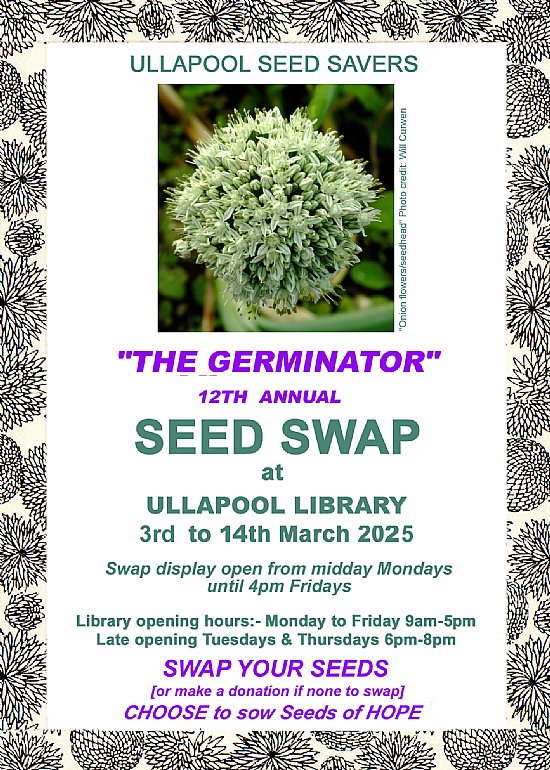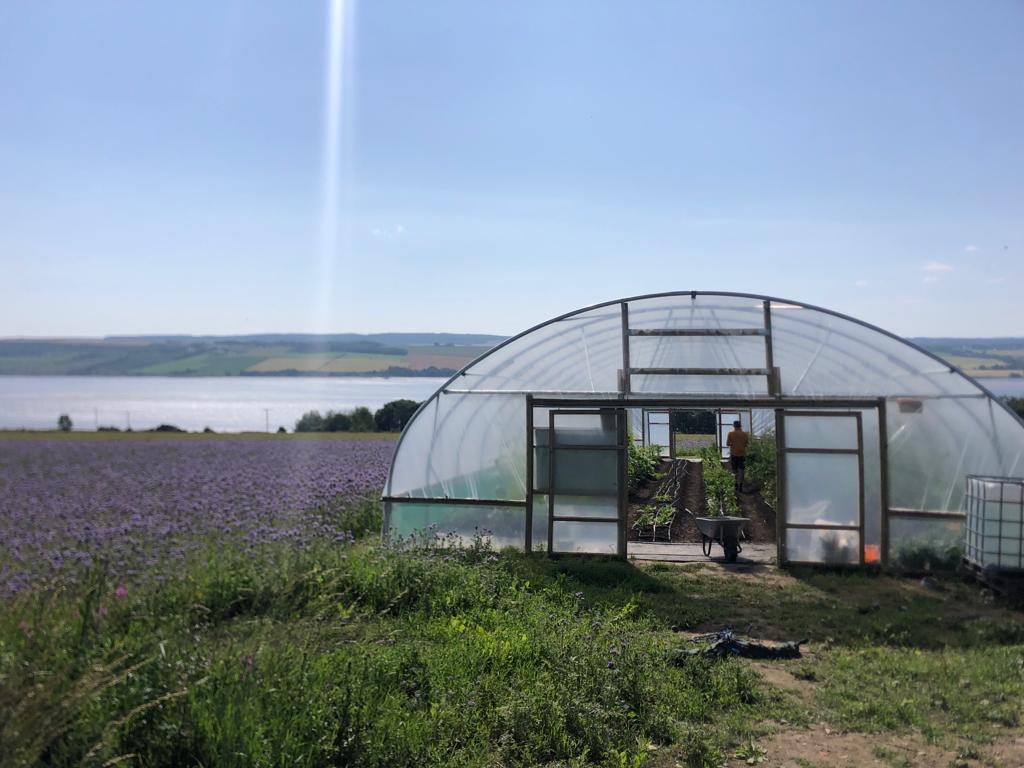Seed Saving & Seed Sovereignty
*February 2025
Ullapool Seed Savers seed swap fortnight
Monday 3 - Friday 14 March 2025 Ullapool Library
Every year Ullapool Seed Savers and TBI advertise each other’s event

-------------------------
*April 2024
GALE Seed Swap 2024
From Gairloch & Loch Ewe Action Forum
Calling all garden enthusiasts! Have you heard about the amazing seed swap currently happening at The GALE Centre? It's an absolute must-visit for anyone looking to explore a delightful world of plant varieties and gather some incredible inspiration for their own garden.

-------------------------
*April 2024
Ullapool Seed Savers annual Seed Swap . .
. . is now at Elphin Tea Rooms
-------------------------
*Seeds of Scotland local seed catalogue
Hayley of Seeds of Scotland believes TBI people will be interested in buying local seeds from their small company based near Dingwall, and has asked us to publicise the catalogue on their website at
https://www.seedsofscotland.com/ (click 'Seed shop' on the menu).

-------------------------
Seed saving - an introduction by Martin Sherring
Anyone with a veg plot will have marvelled at the amount and variety of food that can be produced by tiny seeds, and will know the annual ritual of poring over seed catalogues – but it’s worth spending a few minutes thinking about how the seeds got into their packets! Here are a few concerns you may want to bear in mind.
Genetic diversity
Many will know that legislation determines the seed varieties which can be sold in the UK – if it isn’t on our “National List” or on that of one of the other EU countries, it can’t be sold commercially. (Of course that may change with Brexit…) And the only way new varieties can be admitted to the National List is for someone to submit them for testing – an expensive business. Even after the variety has been added to the list, someone needs to be its official “maintainer”, and pay an annual fee. The cost involved means that many old varieties, especially those more of interest to smaller-scale growers, never made it onto the list, and most of the new ones are designed to suit farmers and supermarkets. So we have seen a massive loss in the genetic variation of seeds, making us less resilient to disease or changes in growing conditions – just when, with climate change, we’re seeing big changes in growing conditions. Of course, there are benefits to this legislation – it means that people can be confident, when they buy seed, that it is actually the variety it’s supposed to be! But it’s debatable whether that makes up for the lost diversity.
Globalisation
With increasing globalisation, most seeds are now grown overseas - in 1959, for example, 600 hectares in Essex were under cultivation for broad bean seeds; by 1980, only 200 hectares were used for growing all flower and vegetable seed across the whole UK. So again, we are seeing a reduction of our resilience – most of our seed “eggs” are in a few big, overseas “baskets”!
Fewer open-pollinated varieties
This is the issue of F1 hybrid varieties, which increasingly dominate the seed catalogues. These can (but don’t always!) produce better crops, but they tend to be more expensive because the hybrids need to be crossed under controlled conditions, sometimes by hand. Much worse though, they don’t come true from seed – so they have to be bred from scratch every year. Once again, we’ve lost some of our resilience - to get these F1 varieties we are relying on specialist businesses.
Organic growing – or not
And finally, for those who grow organically, only 3% of all seeds available in the UK have been grown organically. That may not make that much difference to the plants you grow, but if you’re going to the trouble to grow organically yourself, it seems sensible to encourage organic seed production.
Alternatives
Fortunately there is increasing interest in saving seed from open-pollinated varieties. Transition Black Isle has been running a “Seed Swap” in late winter/ early spring for the last few years, and there are a few other ways to obtain locally produced seed:
- Garden Organics’ Heritage Seed Library holds seed from about 800 varieties. Each year their members get the opportunity to choose up to six packets from around 150 of these varieties (those which have enough seed to be made available). Membership costs £18/ year for Garden Organics members.
- Real Seeds is a seed merchant with a difference – they only supply open-pollinated varieties, specialise in unusual and heritage plants, and encourage their customers to save their own seed. Strictly speaking, to allow them to sell seeds outwith the National List, their customers form a club, but as life membership only costs 1p, that’s not much of a barrier!
- The Seed Co-operative is a community-owned seed merchant. All their seeds are produced organically or biodynamically and they aim to source as much seed as possible from within the UK.
- Closer to home, the Poynzfield Herb Nursery sells their own seeds as well as plants, and has a fantastic range of herbs acclimatised to the Black Isle.
Seed Sovereignty Programme
January 2021
Film and photo story from Wales
Katie Hastings, Wales co-ordinator for the Seed Sovereignty programme, has drawn our attention to these
I’m delighted to share with you the release of our short film Llafur Ni
This is a really beautiful film telling the story of Owen, Iwan and Gerald, and their connection through the Ceirch Du Bach Black Oat.
I strongly encourage you to share it as part of #seedweek and spread the message of the need to preserve grain diversity. #llafurni
Diolch yn fawr iwan to Owen, Iwan and Gerald for sharing their words and songs.
Thank you all for being part of this amazing network to preserve Welsh heritage and genetic diversity.
Katie Hastings Gaia FoundationWales Coordinator – UK and Ireland Seed Sovereignty Programme
-------------------------
Seed Sovereignty Programme - background
The Seed Sovereignty Programme is an ambitious 3-year venture to develop a resilient, agroecological seed system across the UK and Ireland. The Gaia Foundation is working closely with actors across the existing seed movement - including the Soil Association, the Organic Research Centre, the Irish Seed Savers Association, the Seed Cooperative and the Landworkers Alliance - and supporting new and emerging projects across the diverse landscapes of the British Isles. This is the first large-scale collaborative effort of its kind in the UK and Ireland.
With genetic and agro-biodiversity as its central focus, the programme is underpinned by the principles of seed and food sovereignty - the right to locally adapted seed, available to all. The programme will support the broad range of agro-ecological farming operations that exist, incorporating all seed grown within these systems. It will encourage skill sharing, networking and collaboration across the UK seed movement, creating a more cohesive and connected counter force to the pressures of industrial agriculture, and the uncertainty ahead as Britain prepares to leave the European Union.
Read more on Background and Canadian origins
Development in the UK and Ireland
Seed Sovereignty
website https://www.seedsovereignty.info
Facebook https://www.facebook.com/Scotseedsov/
Latest News...
 THURSDAY 20 MARCH was World Rewilding Day
Thursday 20 March Worldwide
World Rewilding Day was lau... More >>
THURSDAY 20 MARCH was World Rewilding Day
Thursday 20 March Worldwide
World Rewilding Day was lau... More >>Forthcoming Events…
- Saturday 29 March
- 10:00 North Kessock Community Market
- Tuesday 1 April
- 11:00 'Green Tourism' webinar
- Thursday 3 April
- 19:15 TBI trustees meeting
- Friday 4 April
- 09:30 Allangrange workshop - Introduction to biodynamic growing
- 16:00 Culbokie Green - Toilets and Potting Shed preview
- Monday 7 April
- 14:00 Highland Community Led Local Development Fund Briefing
- Saturday 12 April
- 10:30 Cromarty Community Market
- Saturday 19 April
- 10:00 Cukbokie Community Market
Events to add to calendar? Contact Us.
TBI Business Directory
Add Your Business
Do you run a sustainable business on or near the Black Isle? Add it to the TBI business directory
Browse Directory
- Accommodation (3)
- Crafts (9)
- Health and fitness (8)
- Home improvements (17)
- Local food suppliers (18)
- Miscellaneous (35)
- Renewable energy (18)


